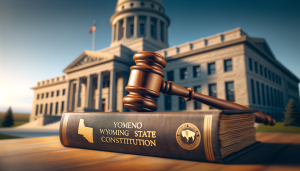In apparent reversal, Cameron says he’d support rape, incest exceptions to Kentucky abortion ban

Kentucky Attorney General Daniel Cameron stated Monday that “there is no doubt” he will sign a bill adding exceptions to Kentucky’s nearly total ban on abortion for rape or incest if he becomes governor.
The Republican candidate’s statement on the Tony & Dwight Show on NewsRadio 840 WHAS is a significant departure of his previous position, in which he supported the ban as it is.
Kentucky’s trigger law went into effect after the Roe v. Wade decision was reversed last year. It criminalizes abortions except in cases where a pregnant woman’s life is at risk. A fetal-heartbeat law or six-weeks ban also became effective. This law prohibits abortions after fetal heartbeat activity is detected. Usually around six weeks into pregnancy.
Both laws have virtually eliminated abortions in Kentucky.
|
Cameron stated on the show that if our legislators brought me legislation that allowed for exceptions to rape and ingest, I would be happy to sign it. “There is no doubt about it.”
The Herald-Leader questioned the Cameron campaign on why and when he changed his position or if he would actively encourage the legislature pass a bill that included exceptions. The campaign released a statement which did not directly answer many of these questions but reiterated Cameron’s statements while reaffirming their support for the existing law and openness to supporting any changes to its exceptions.
“Daniel Cameron, the pro-life governor candidate, supports the Human Life Protection Act. “But if the Kentucky situation were to change, and the legislature presented him with a bill that added exceptions for incest and rape, he would sign it,” Courtney Norris, spokesperson, said in a press release.
Norris also compared Cameron’s position to Beshear who she called “extremist” in the matter.
The hosts of the radio show asked Cameron to comment on a recent advertisement from Gov. Andy Beshear, who is running for re-election in Kentucky, criticized Cameron’s support of these bans.
Erin White, who is a Louisville prosecutor and was most recently employed by the Jefferson County Attorney’s Office, uses her experience in pursuing serious criminals to call Cameron’s abortion position unconscionable.
White stated that Daniel Cameron believes a 9-year old rape victim should be forced into giving birth. No child should have to endure that. Cameron believes that rapists are entitled to more rights than victims. “That’s dangerous and extreme.”
Cameron said that he will ensure Kentucky has a life-style culture.
“But what has been said in the ads is shameful.” Cameron stated that if someone rapes an innocent child, they will be prosecuted with full force of law. He then made his comment about supporting exceptions.
He continued, “The Beshear Administration and the Beshear Campaign are running a smear against me but it won’t work because people can see through the garbage that they are putting out on television.”
Alex Floyd, spokesperson of the Beshear Campaign, stated that Cameron was clear about his support for Kentucky’s “extreme ban on abortions with no exceptions made for survivors of rape and incest.”
Floyd stated in a press release that “he has repeatedly repeated this position in public statements and questionnaires as well as in interviews with the media, debates, and in other forums.” “As Attorney General, Cameron repeatedly defended the extreme law and its lack of exemptions before multiple courts, including Kentucky Supreme Court. Cameron has either changed his core beliefs in light of recent polling results, or he’s lying to Kentuckians as an election is just seven weeks away.
Beshear regularly slams Republicans for their “too-extreme” position regarding exceptions to rape and incest, but has said little about his own stance on abortion rights. He has said that he thinks Roe was “generally correct” when he is pressed. Roe allowed abortions up to viability, which occurs in the late second trimester.
“This should ultimately be a rare but legal procedure. It could be subject to reasonable restrictions. Beshear stated last year that he has always been opposed to late-term procedures.
The hosts of the radio show also asked Cameron to comment on another controversy that has recently surrounded his campaign, namely his answers to the Northern Kentucky Right to Life Candidate Questionnaire.
The April survey falsely equates emergency contraception with “the standard birth control pill” and Cameron’s “yes” answer to the question about whether he would support criminalizing birth-control because he answered “yes” when asked if he would support making it “a crime” to perform an abortion or to assist in one.
Cameron has called his critics ‘completely absurd’ once more.
Cameron stated on the show, “Again it’s completely absurd.” “I am in favor of birth control. I support contraception. Andy Beshear is again waging a smear-campaign. They know they are going to lose the race and they are doing everything they can to try to win.
Cameron responded to the Herald-Leader’s questions on Friday by stating that he does not support taxpayer money, including Medicaid, being used for contraception.
Cameron’s support for Kentucky’s current laws has been repeated in recent months when he was asked about adding exceptions.
In a debate held in March ahead of the Republican Primary, candidates were explicitly asked if they supported adding exceptions for rape and ingest. Cameron avoided the question by saying “Well, I do support the current laws.”
Cameron gave a similar answer in a Republican debate held in May. Cameron was asked to give a yes/no answer twice about exceptions. Both times he reiterated his support of the Human Life Protection Act, the trigger law.
Cameron’s office only hinted publicly at possibly endorsing adding rape and sex abuse exceptions to Kentucky’s abortion bans during oral arguments before the Kentucky Supreme Court in November last year.
Cameron has always defended Kentucky’s strict restrictions on abortion. In a court case last year, Kentucky’s remaining two outpatient abortion clinics argued that Kentucky bans violated a person’s right of privacy and bodily independence under the Kentucky Constitution.
Kuhn told the justices of the high court that it was in their power to include rape and acest exceptions when they ruled on the case. The court had to decide whether or not it would reinstate an injunction that temporarily blocked both laws.
If the court is concerned about the absence of a rap









No Comments